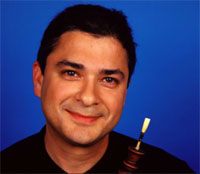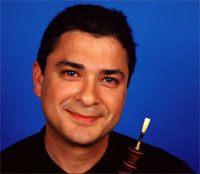
Such splendidly colorful and imaginative bassline-playing really deserves to be attended to for its own sake, but it was, in truth, difficult to turn your mind even momentarily from the oboe playing.Ruiz seems more remarkable every time I hear him. You would not guess from his playing that there is anything particularly difficult about the Baroque oboe. (Nor, even, that playing it required anything so mundane as taking breaths; I was beginning to suspect circular breathing in a few passages.) His tone is even from top to bottom, and his fluency in every range is striking.
The program stuck to the 18th century, yet ranged widely in style and difficulty. French music occupied the first half. A suite of dances by Pierre Danican Philidor (leader and composer in residence to the French court’s oboe band, among other things) was suave and sympathetic to the instrument. A suite from François Couperin’s Les Goûts-réünis showcased Ruiz’ supple tone marvelously; I was particularly taken with a “Saraband mesuré” that had a touching petit reprise (sort of a minirepeat) to end its second half.
The three sonatas on the program’s second half were more taxing. Ruiz recorded the C-minor Handel sonata (HWV 366) some 15 years ago, but Saturday’s account, fluid and effortlessly natural, put that version in the shade. The following Telemann sonata (in F major, TWV 41:F4) was a surprise — uncharacteristically demanding for a composer who generally shunned self-conscious virtuosity. On looking up the piece I was interested to discover that Telemann’s own edition (the famously versatile composer, among other activities, engraved and published a fair amount of his own music) designated it for flute or violin, not oboe. That would explain music that seemed to presume a little too much of a Baroque oboist — though, again, you would scarcely have known it from Ruiz’ performance, which romped through the second movement’s repeated notes and the last movement’s roulades as though there were no evident difficulty.
Black Versus White?
The Vivaldi sonata (in C minor, RV 53 — though mislabeled RV 375 in program and notes) that ended the recital came as an even greater shock. Ruiz, introducing the work, half-jokingly laid out a plot line about “good” (the oboe) versus “evil” (everyone else), which sounded lame until you laid ears on the piece. The first movement begins with a jagged, craggy introduction for continuo alone, on which the oboe, several bars in, overlays a consolatory gesture. There follow other jolts: a second movement full of disconcerting chromaticism, a perpetual-motion finale in 9/8 time that is a tour de force for the fingers (not to mention the lungs). The Vivaldi sonatas I’ve encountered (all for violin and continuo) have never struck me as especially interesting; how odd is it, then, that the composer’s sole dedicated oboe sonata should be such a barnstormer?A continuous program of oboe music might tax even Ruiz‘ breathing capacity; luckily, Voices of Music had arranged a little respite on each half. Between the Philidor and the Couperin, Skeen played a Marin Marais suite (in G major, from Book 5 of the viol music) with terrific élan and enviable security in some difficult double-stopping. And between the Telemann and the Vivaldi, van Proosdij abandoned the harpsichord for the voice flute (a slightly larger cousin of the alto recorder), Tayler took up a guitar, and they and Skeen (on cello) performed a freestanding Handel minuet (HWV 375).
There was one well-deserved encore: the Rondeau from Bach’s B-minor Suite, down a step in Ruiz’ own (recently recorded) oboe version of a flute original.

